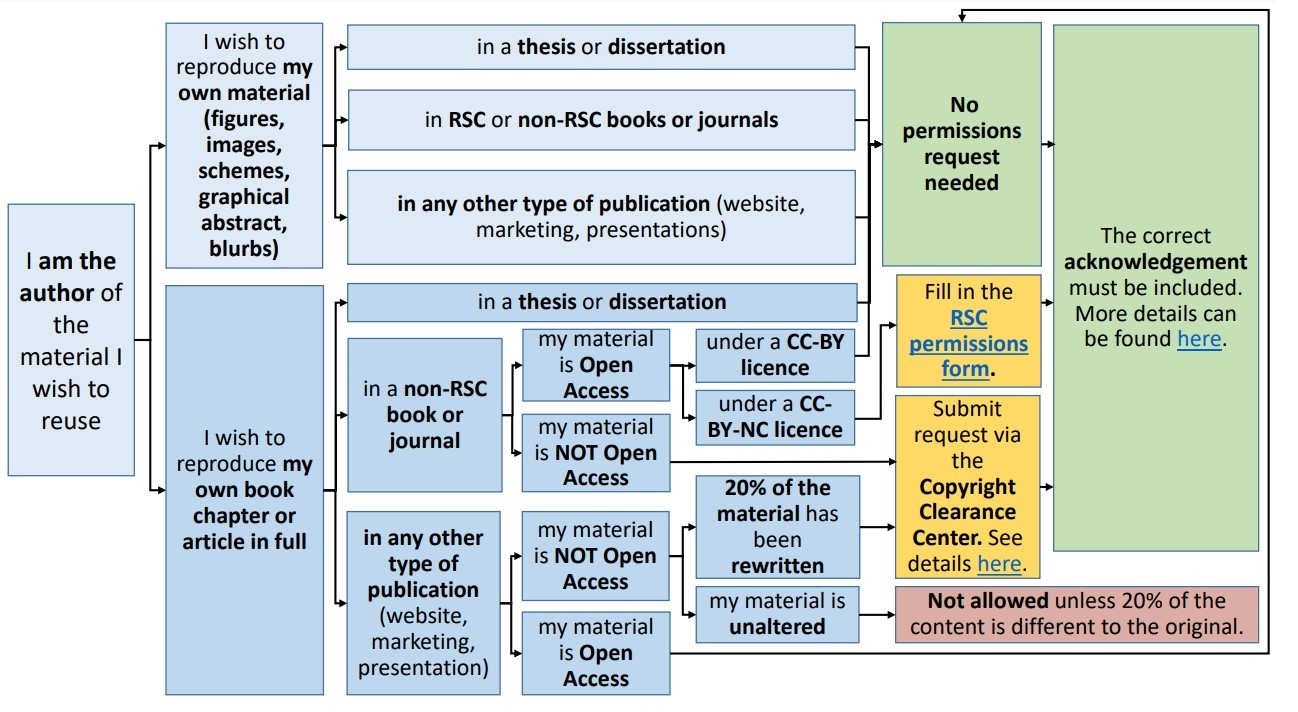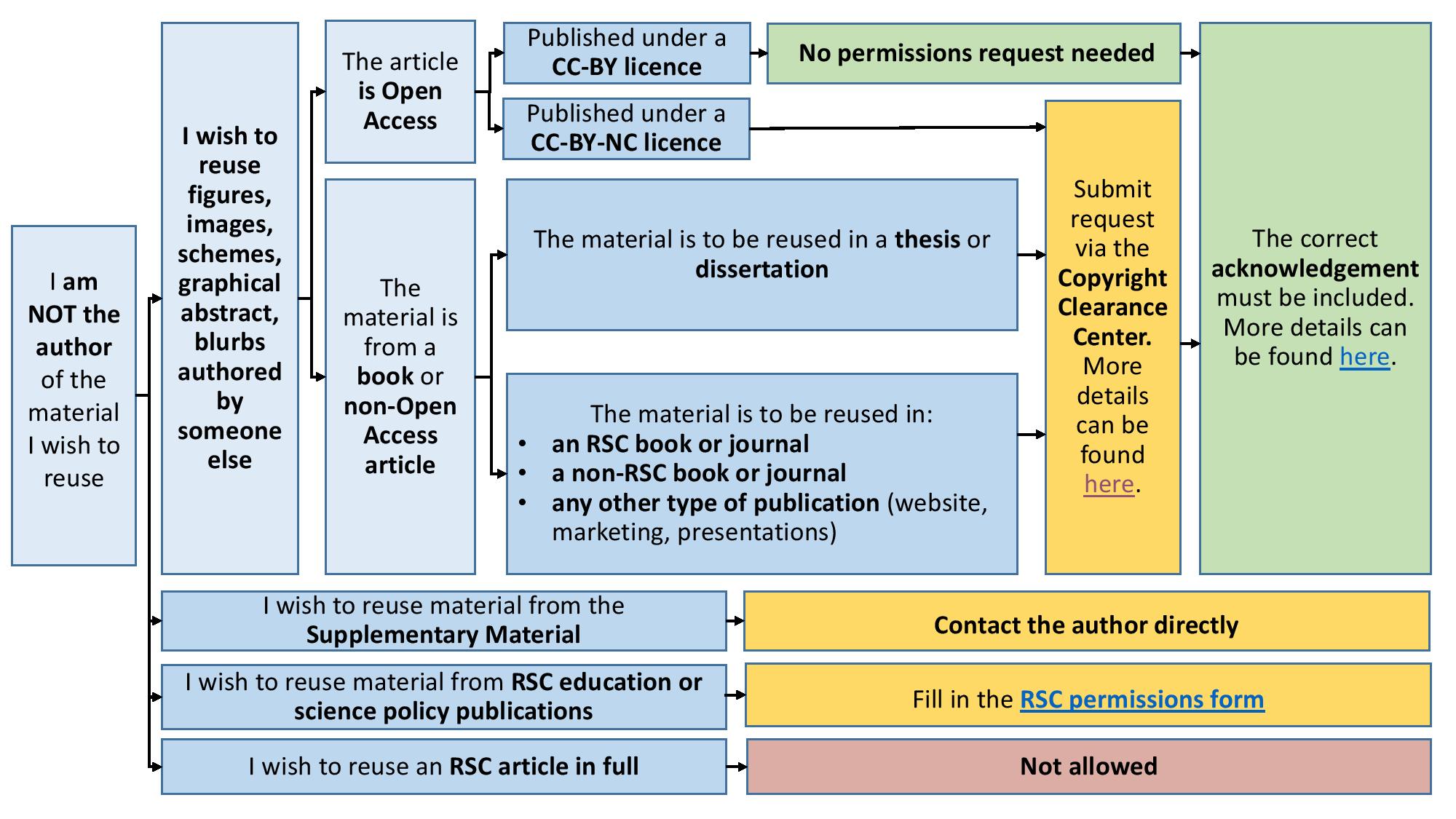When you publish in a UUÂãÁÄÖ±²¥ of Chemistry journal, you keep the copyright of the manuscript. On this page you can learn more about our Licence to Publish and the rights you retain as an author. We also explain where you can deposit and share your article, and how to request permission to re-use other people’s work.
The following details apply only to authors accepting the standard Licence to Publish. Authors who are interested in publishing open access should visit our open access pages for more information about our open access licences and deposition rights.
On this page
About our licence to publish
Rights retained by authors
Deposition & sharing rights
Reusing UUÂãÁÄÖ±²¥ of Chemistry material
Using third party material in UUÂãÁÄÖ±²¥ of Chemistry publications
Reproducing material from a Gold open access article
Assurances
In the licence to publish, the author provides the assurances that we need to publish the material, including assurances that the work is original to the author, that the work has not been published already and that permissions have been obtained if previously published material has been included.
Download the UUÂãÁÄÖ±²¥ of Chemistry licence to publish.
If the manuscript includes material that belongs to someone else (for example, a figure or diagram), we require the author to obtain all permissions that may be needed from third parties. If you wish to reuse material that was not published originally by the UUÂãÁÄÖ±²¥ of Chemistry please see Re-use permission requests.
Rights retained by authors
When the author accepts the exclusive licence to publish for a journal article, they retain certain rights that may be exercised without reference to the UUÂãÁÄÖ±²¥ of Chemistry.
Reproduce/republish portions of the article (including the abstract).
Photocopy the article and distribute such photocopies and copies of the PDF of the article for personal or professional use only (the UUÂãÁÄÖ±²¥ of Chemistry makes this PDF available to the corresponding author of the article upon publication. Any such copies should not be offered for sale. Persons who receive or access the PDF mentioned above must be notified that this may not be made available further or distributed.).
Adapt the article and reproduce adaptations of the article for any purpose other than the commercial exploitation of a work similar to the original.
Reproduce, perform, transmit and otherwise communicate the article to the public in spoken presentations (including those that are accompanied by visual material such as slides, overheads and computer projections).
The author(s) must submit a written request to the UUÂãÁÄÖ±²¥ of Chemistry for any use other than those specified above.
All cases of republication/reproduction must be accompanied by an acknowledgement of first publication of the work by the UUÂãÁÄÖ±²¥ of Chemistry, the wording of which depends on the journal in which the article was published originally. The acknowledgement should also include a hyperlink to the article on the UUÂãÁÄÖ±²¥ of Chemistry website.
The author also has some rights concerning the deposition of the whole article.
Deposition and sharing rights
The following details apply only to authors accepting the standard licence to publish. Authors who have accepted one of the open access licences to publish, or are thinking of doing so, should refer to the details for open access deposition rights.
When the author accepts the licence to publish for a journal article, they retain certain rights concerning the deposition of the whole article. This table summarises how you may distribute the accepted manuscript and version of record of your article.
| Sharing rights | Accepted manuscript | Version of record |
| Share with individuals on request, for personal use | ✓ | ✓ |
| Use for teaching or training materials | ✓ | ✓ |
| Use in submissions of grant applications, or academic requirements such as theses or dissertations* | ✓ | ✓ |
| Share with a closed group of research collaborators, for example via an intranet or privately via a scholarly communication network | ✓ | ✓ |
| Share publicly via a scholarly communication network that has signed up to STM sharing principles | ⌛ | ✕ |
| Share publicly via a personal website, institutional repository or other not-for-profit repository | ⌛ | ✕ |
| Share publicly via a scholarly communication network that has not signed up to STM sharing principles | ✕ | ✕ |
If you are a reader looking for the terms of use for information published by the UUÂãÁÄÖ±²¥ of Chemistry under our standard licence to publish please refer our terms of use.
CHORUS
We are members of the CHORUS initiative, and therefore make the Accepted manuscript version of articles describing research funded by participating funders publicly available on our web site after an embargo period of 12 months. This is effective for research published from 1st March 2018 onwards. Unless otherwise noted on the article the Accepted manuscript is licensed under the terms of our standard license to publish and is subject to our standard reuse terms.
Reusing UUÂãÁÄÖ±²¥ of Chemistry material
Reuse permissions requests
Material published by the UUÂãÁÄÖ±²¥ of Chemistry (UUÂãÁÄÖ±²¥) and other publishers is subject to all applicable copyright, database protection and other rights. The graphic below outlines the steps to obtain permission to reuse UUÂãÁÄÖ±²¥ materials, where required:
How to request permission from the UUÂãÁÄÖ±²¥ via the Copyright Clearance Center
Journals
Find the journal article from which you want to reproduce material and go to the article landing page by clicking on the article's title.
Click on 'Request permissions', which will open up a new window containing permissions information for the article. If required, click on 'Formally request permission' to go to the Copyright Clearance Center.
Please note that these pathways won’t be available if the UUÂãÁÄÖ±²¥ material you wish to reuse is published under a CC-BY or CC-BY-NC licence. More information can be found here
Books
Refer to Copyright Clearance Center’s Buyer Guide to submit a request to reuse material from a book. Queries regarding this service should be addressed to customercare@copyright.com.
Drop-down menus in the Copyright Clearance Center
Use the drop-down menus to select the reproduction options you require and provide any additional details needed. You will obtain the permission for free if both of the following conditions apply:
- your request falls within the terms of the STM Permission Guidelines (in short, up to three figures or a single text extract of less than 400 words).
- you are reproducing the material in a publication published by another STM Publisher (i.e. publishers who have signed up to the STM Permission Guidelines, for example, American Chemical Society, Elsevier, Springer and Wiley), or you are reproducing the material in your thesis for submission to your educational institution
After ‘Describe who will republish the content (person or entity)...’ if you are:
- reproducing the figure in a thesis or dissertation, please specify 'Academic institution'
- reproducing the material in a publication published by a member of the STM Association, select 'Publisher, STM'
When your order has been accepted you will be sent an email providing the order confirmation and any licence details. If you need any support to submit your request, please refer to . Queries regarding this service should be addressed to customercare@copyright.com.
Proof of permission
If you require a signed permissions form, please submit the Permissions Request Form (PDF) instead of the form above. Our Contracts and Copyright team will organise an electronic signature and return the form to you.
Using third party material in UUÂãÁÄÖ±²¥ of Chemistry publications
We must ensure that the material we publish does not infringe the copyright of others. We require the author(s) to obtain, at the earliest opportunity, the relevant permissions that might be needed from third parties to include material that belongs to someone else.
Please contact the publisher/copyright owner of the third party material to check how they wish to receive permission requests. Please plan to submit your request well ahead of publication of your material.
The most common procedures for permission requests are outlined below.
- A number of publishers have opted out of receiving express permissions as long as they fall under the rules of the .
- If they do not fall into the category above, the majority of publishers now use the Copyright Clearance Center (CCC) to process their requests.
- Other publishers have their own permission request forms and/or specify what information they need to process any permission request.
- If the publisher/copyright owner does not have a specific procedure please complete and submit the Permission Request Form for non-UUÂãÁÄÖ±²¥ material form, instead of the form above. Send the form to the permission administrator or editor of the relevant publication.
- If the copyright owner has opted to publish under a Creative Commons licence, licensees are required to obtain permission to do any of the things with a work that the law reserves exclusively to a licensor and that the licence does not expressly allow. Licensees must credit the licensor, keep copyright notices intact on all copies of the work, and link to the license from copies of the work.
In all cases the following rights need to be obtained. Permission is required to include the specified material in the work described and in all subsequent editions of the work to be published by the UUÂãÁÄÖ±²¥ of Chemistry for distribution throughout the world, in all media including electronic and microfilm and to use the material in conjunction with computer-based electronic and information retrieval systems, to grant permissions for photocopying, reproductions and reprints, to translate the material and to publish the translation, and to authorise document delivery and abstracting and indexing services.
Please note that the UUÂãÁÄÖ±²¥ of Chemistry is also a signatory to the STM Permission Guidelines.
Reproducing material from a Gold open access article
If you wish to reproduce material (figures, tables etc.) from a Gold open access paper the following applies:
- If the figure caption states that the figure has been reproduced from another article you need to request permission from the publisher of that article.
- If the figure caption does not state that the figure has been reproduced from another article and the open access article has been published under a CC-BY licence you can reproduce the figure without formal permission as long as it is fully acknowledged.
- If the figure caption does not state that the figure has been reproduced from another article and the open access article has been published under a CC BY-NC licence you will have to request permission from the publisher of the open access article. Please note that you do not have to formally request permission to reproduce figures from one UUÂãÁÄÖ±²¥ publication in another UUÂãÁÄÖ±²¥ publication providing that you include the correct credit line.
- Email:
- Send us an email
Contact us
- Tel:
- +44 (0) 1223 432176
- Email:
- Customer Services team, Journals
Share
Advertisement


